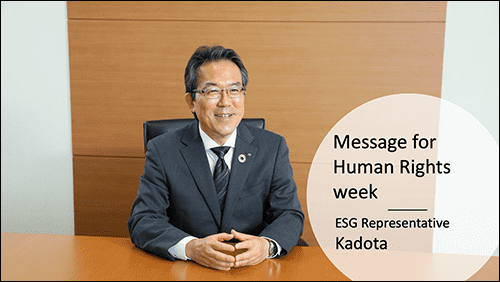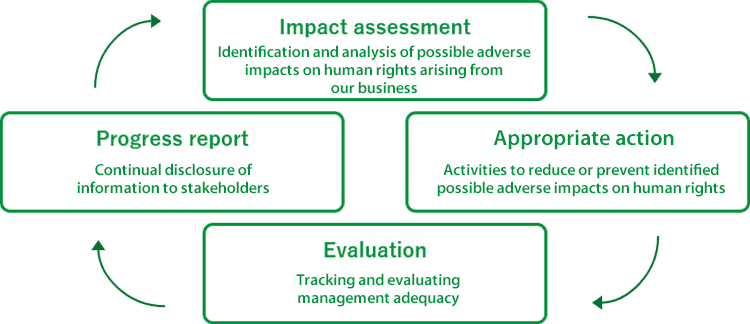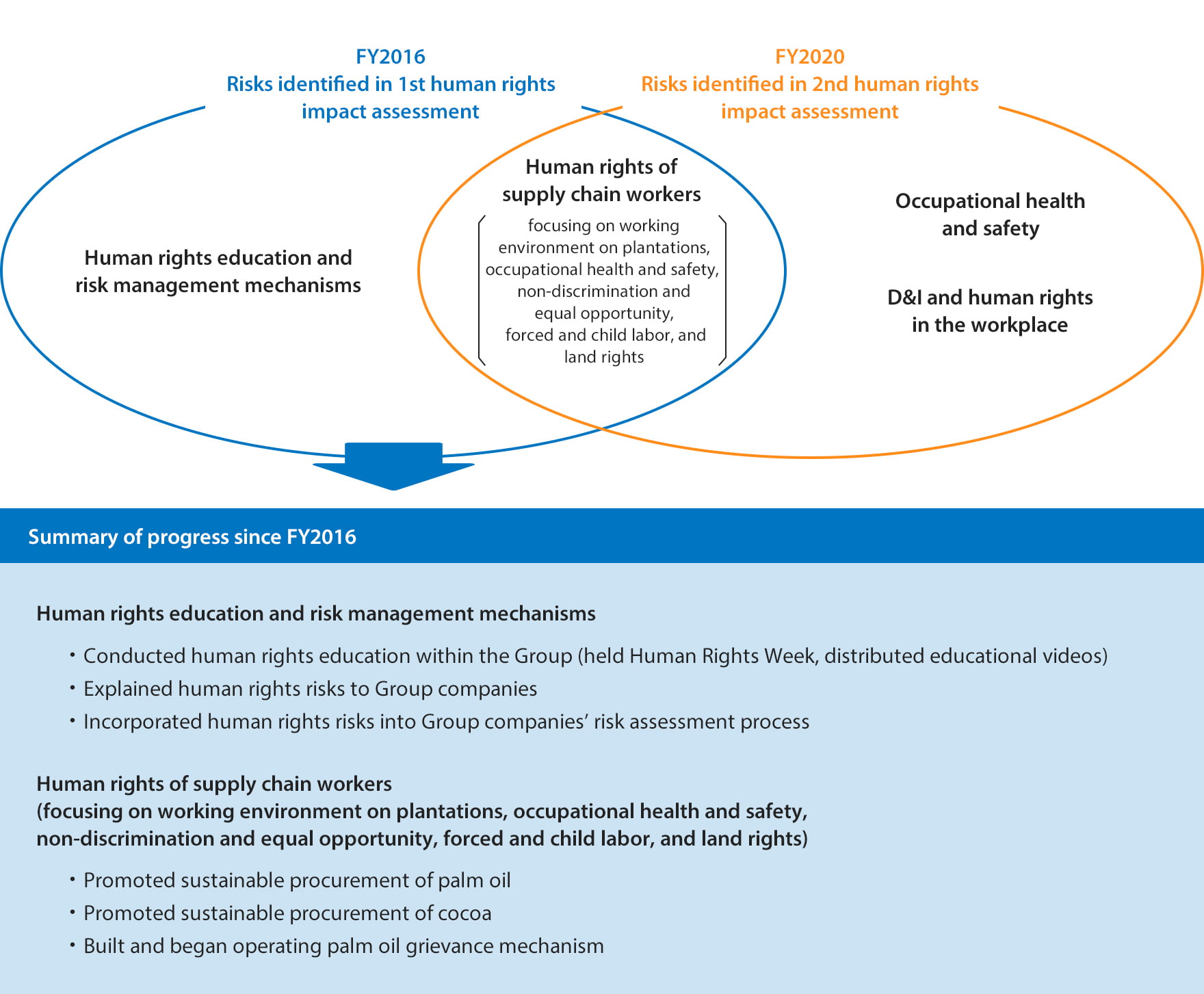Human Rights Management
Management information
Basic approach
The Fuji Oil Group has a responsibility to respect the human rights of all stakeholders, and we strive to uphold this in accordance with our commitment to “Work for people” as declared in our Group Management Philosophy. In April 2017 we announced the Fuji Oil Group Human Rights Policy, which lays out our basic approach to human rights. Then in March 2023 we established and announced the Fuji Oil Group Human Rights Guidelines to serve as specific principles that guide the shared recognition for respect for human rights in all employees, and to help us fulfill this responsibility in our business activities.
Management system
Under the supervision of the ESG Division Officer of Fuji Oil Holdings Inc., the Sustainability Development Group supervises relevant divisions, works to identify human rights risks, promotes awareness of human rights, and encourages human rights practice at all workplaces and business sites. Key human rights risks identified are incorporated into our material ESG issues.*1 The Sustainability Committee,*2an advisory body to the Board of Directors, monitors the progress and results of initiatives.
Specific initiatives
Educational, promotion and awareness activities
We designated the week of December 10, International Human Rights Day, as Fuji Oil Group Human Rights Week. In this opportunity, leadership statements on business and human rights are shared with all Group employees, and e-mail messages are sent to draw attention to the event. In FY2022, we also shared examples of Group initiatives (in sustainable procurement and occupational health and safety) on our internal communication site in Japanese, English, Chinese and Portuguese to raise awareness within the company.

A leadership statement posted on our internal communication site (Japanese, English, Chinese, and Portuguese)
Business and human rights e-learning video
Human rights due diligence
Overview
The UN Guiding Principles on Business and Human Rights clearly state that businesses also have the responsibility to respect human rights. The principles require that businesses comply with all the applicable laws and regulations. This corporate responsibility consists of three components: policy commitment, human rights due diligence, and remediation. The Fuji Oil Group conducts human rights due diligence as part of the “implementation of the responsibility to respect human rights” specified in the Group's Human Rights Policy.

Impact assessment process
The Fuji Oil Group conducts human rights impact assessments following the process advocated by the UN Guiding Principles on Business and Human Rights and with guidance from outside experts to identify and evaluate the possible adverse impacts of our business activities on human rights and to identify priority key issues. We conducted our first assessment in FY2016, and second assessment in FY2020, to identify our human rights risks. During the second assessment in FY2020, we received guidance from BSR, a third-party expert on business and human rights.
In the first stage, we identified human rights risks based on the nature of the Group's business and our operating locations using the expertise of BSR.
In the second stage, we conducted interviews with relevant in-house parties to incorporate as much information from our actual operations as possible. In this stage, done in collaboration with BSR, we identified six categories where our business can have a human rights impact: 1) Occupational health and safety, 2) Human rights of supply chain workers, 3) Diversity and inclusion (D&I) and human rights in the workplace, 4) Food safety, 5) Governance, risk, and compliance, and 6) Climate impact on human rights.
In the third stage, following expert guidance, we selected three categories of human rights risks to address as priority issues: 1) Occupational health and safety, 2) Human rights of supply chain workers, and 3) D&I and human rights in the workplace. These identified risks have been reported to our executive team. In the medium-term we will work to reduce risks in these three categories and disclose our progress through sustainability reports and other channels.
Results of 1st and 2nd human rights impact assessments and progress on addressing risks identified in 1st assessment

In-depth look at risks identified in 2nd human rights impact assessment
| Risks identified in 2nd human rights impact assessment | Special points to confirm/consider (recommended by experts) | Actions | FY2022 Results |
|---|---|---|---|
| Occupational health and safety Relevant stakeholder group: Employees |
|
|
|
| Human rights of supply chain workers (focusing on working environment on plantations, occupational health and safety, non-discrimination, and equal opportunity, forced and child labor, and land rights) Relevant stakeholder group: Supply chain workers |
|
|
|
| D&I and human rights in the workplace (harassment, forced labor) Relevant stakeholder group: Employees |
|
|
|
Grievance mechanisms
Internal whistleblowing hotline system for employees
We have established a whistleblowing hotline system* for employees of Group companies inside and outside Japan and employees of some cooperating companies.
Grievance mechanism for our supply chains
In May 2018, we established and announced a grievance mechanism* based on our Responsible Palm Oil Sourcing Policy. We set up a grievance mechanism webpage in English on the Fuji Oil Group website to announce the mechanism and its progress.
Fuji Oil Group Human Rights Guidelines
In FY2022 we established the Fuji Oil Group Human Rights Guidelines to address human rights issues related to Group workplaces and employees. The Guidelines are a part of our response to the “human rights in the workplace (harassment, forced labor)” risks identified in our second human rights impact assessment, and will function as specific guidelines within our comprehensive human rights management system. This was a point raised in our dialogue with BSR in FY2021. The guidelines have been translated into all nine languages that are spoken by our employees (Japanese, English, Chinese, German, Flemish, Thai, Indonesian, Malaysian and Portuguese). We have also begun identifying and monitoring the responses to human rights risks at each Group company.